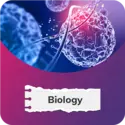
Biology, often referred to as the study of life, is a vital academic subject taught across all grades and curricula worldwide. It explores the structure, function, growth, origin, evolution, and distribution of living organisms. As a core component of the sciences, Biology nurtures a sense of curiosity about the natural world and the mechanisms that govern life processes. Beginning with foundational concepts in early grades, the subject gradually advances into complex topics such as genetics, cellular biology, physiology, ecology, and biotechnology in higher grades. Biology offers students a deep appreciation of the interconnectedness of life and equips them with knowledge crucial for health, sustainability, and ethical decision-making.
Biology is foundational to understanding life and promoting awareness of health, environment, and ethical issues. In a world grappling with pandemics, environmental crises, and genetic advancements, Biology prepares students to think critically and make informed choices. It supports multiple interdisciplinary connections, linking with Chemistry, Physics, Geography, and even Philosophy and Ethics. Whether students aspire to become doctors, researchers, environmentalists, or informed citizens, Biology plays an essential role in shaping analytical and empathetic thinkers.
Biology paves the path to numerous career fields, including but not limited to:
Biology naturally intersects with several other subjects:
Biology is introduced in a simplified form as early as Grade 1 or 2 under integrated Science. At this stage, students learn about basic plant and animal life, parts of the body, senses, and habitats. In Grades 3–5, instruction becomes more structured, covering ecosystems, food chains, life cycles, and environmental care. From Grades 6–8, Biology is taught as a distinct strand within Science, focusing on human anatomy, classification, cell structure, and health. By high school (Grades 9–12), Biology becomes a standalone subject, offering students in-depth exploration of molecular biology, reproduction, biotechnology, evolution, and ecosystems. For students pursuing IB, IGCSE, or AP curricula, Biology is offered as a core or elective subject with rigorous lab and research components.
Biology assessments are designed to test knowledge, comprehension, application, and scientific inquiry. In lower grades, assessments are oral, visual, or based on worksheets and small projects. In middle and high school, evaluations include structured tests, practical exams, research reports, and viva-voce. International curricula such as AP Biology, IB Biology HL/SL, and Cambridge IGCSE include extensive internal assessments, lab work documentation, and written examinations that test both factual understanding and analytical skills.
Biology curriculum varies across educational systems:
Biology teaching employs various instructional methods to suit different grade levels and curricula. In primary grades, the focus is on visual aids, nature walks, hands-on activities, and storytelling. As students progress, the pedagogy incorporates project work, field studies, dissections, lab experiments, and digital simulations. Inquiry-based learning, flipped classrooms, case studies, and debates are often used at the secondary and senior secondary levels to deepen engagement and promote independent thinking. Curricula such as IB and IGCSE include a strong emphasis on personal investigation and global scientific issues.
Biology, as a school subject, cultivates an essential awareness of the living world. It provides the intellectual tools to explore how organisms function, adapt, and interact. Across grades and curricula, Biology fosters curiosity, critical thinking, and ethical responsibility. In an era of rapid biological and environmental change, the subject equips learners with the knowledge and skills to become responsible stewards of life on Earth, empowering them for diverse educational and professional pathways.